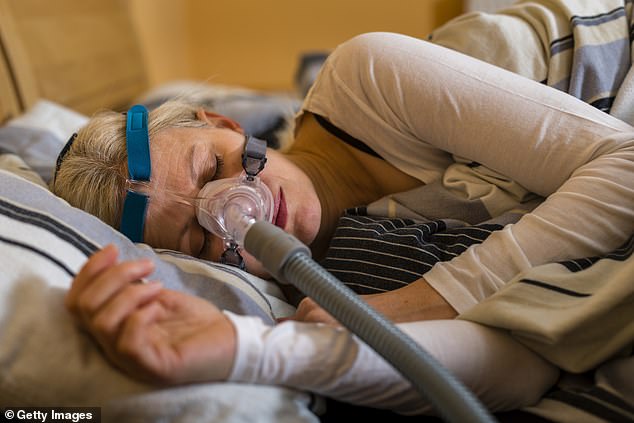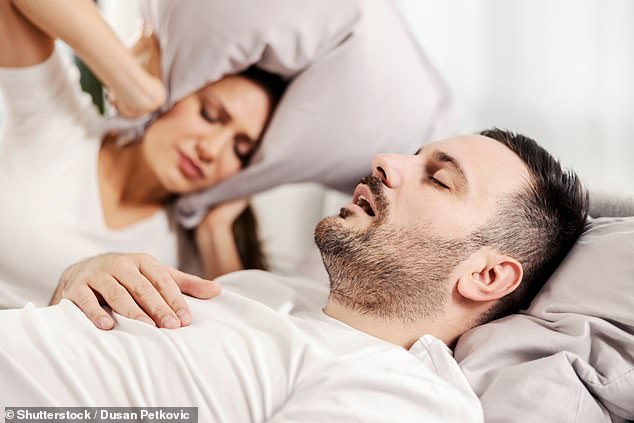Table of Contents
It causes noise and often disrupts the sleep of both the snorer and his or her partner.
But persistent snoring doesn’t just wreak havoc on relationships.
Experts say that ignoring snoring could put you at risk for high blood pressure, heart disease, stroke and type 2 diabetes.
This is because sleep apnoea can lead to a disruption in airflow, fragmented sleep and reduced blood oxygen levels, which puts strain on the cardiovascular system, Mr Pavol Surda, an ENT surgeon and rhinologist at London Bridge Hospital, told MailOnline.
And with an estimated 15 million snorers in the UK – around one in five people, according to the British Snoring and Sleep Apnoea Association – it’s no small problem.
There are around 15 million people in the UK who snore, but around 30 million in the UK are affected by the condition, according to the British Snoring and Sleep Apnoea Association (BSSAA).
So what causes snoring in the first place?
The sound of snoring occurs when the tongue, mouth, throat, or nasal airways vibrate when you breathe. This happens when air cannot flow freely.
This is partly because when we sleep these body parts relax and tighten.
Although this reduction in breathing space is not a problem for most of us, snorers may have an additional obstruction somewhere between the Adam’s apple and the tip of the nose.
This blockage can be inflamed tissue, congestion or deformity, BSSAA says.
People who smoke, are overweight, drink too much alcohol or simply sleep on their back are more likely to snore, according to the NHS.
However, there may be more serious causes of snoring.
“While occasional snoring is usually not a cause for concern, habitual snoring can be indicative of underlying health issues that may require attention,” Surda said.
Is it snoring or sleep apnea?
Waking up frequently during the night, feeling sleepy during the day, and experiencing morning headaches are some of the signs of sleep apnea.
Sleep apnea is a condition that causes your breathing to stop temporarily, resulting in loud snoring.
Mr Surda said: ‘It is important to recognise the signs that snoring may require specialist intervention.
‘Loud and persistent snoring, choking or gasping during sleep, excessive daytime sleepiness and morning headaches, chest pain and nasal congestion are warning signs that should not be ignored.’
There are two distinct types of sleep apnea: central sleep apnea (CSA) and obstructive sleep apnea (OSA), he explains.
CSA is caused when the brain doesn’t send proper signals to the muscles that control breathing during sleep, while OSA is caused by an upper airway obstruction, Surda said.
Obstructive sleep apnea affects more people than central sleep apnea.
Similar to regular snoring, sleep apnea occurs when the muscles in the back of your throat relax excessively, causing your airway to become partially or completely blocked.
However, this disruption of airflow can lead to fragmented sleep and reduced blood oxygen levels, which puts strain on the cardiovascular system.
If left untreated, it can increase the risk of high blood pressure, heart disease, stroke and type 2 diabetes, Surda said.
He said: ‘If you suspect that you or a loved one may have sleep apnea, it is critical to seek help from a sleep specialist.
‘Specialists can perform a comprehensive evaluation, often including a sleep study to monitor breathing patterns, oxygen levels and other vital signs during sleep.
‘Treatment options vary depending on the severity of the condition and may include lifestyle changes, continuous positive airway pressure (CPAP) therapy, oral appliances, or in some cases, surgery.’
It could decrease the quality of your sleep…
We all want a good night’s sleep, but sharing a bed with someone who snores probably means you won’t be able to get a good night’s sleep.
This reduction in sleep can have a range of consequences, from higher stress levels to high blood pressure and even potentially increasing the risk of some types of cancer, according to a 2017 study. review published in Nature and Science of Sleep.
If your snoring is affecting the rest you or your partner get, talking about your symptoms with a doctor might help.
According to the NHS, there are several ways to help control snoring depending on the cause.

A CPAP machine (pictured) is a mask that gently pumps air into your mouth and nose while you sleep. It is designed to improve your breathing while you sleep by preventing your airways from becoming too narrow.
If the problem is that the tongue partially blocks the back of the throat, a device worn in the mouth called a mandibular advancement device can solve this problem by bringing the tongue forward.
Snoring can also be caused by your mouth opening while you sleep. This can be helped by a vestibular shield, a device you wear over your mouth while you sleep that forces you to breathe through your nose. A chin strap that keeps your mouth closed can also help.
If your snoring is caused by blocked and narrowed airways, using strips that keep your nose open while you sleep is another method to stop snoring.
Although sleep apnea can sometimes be treated by making lifestyle changes, such as losing weight, quitting smoking, and reducing the amount of alcohol you drink, many people need to use a device called a CPAP machine.
A CPAP machine is a mask that gently pumps air into your mouth and nose while you sleep. It is designed to improve your breathing while you sleep by preventing your airways from becoming too narrow and, by extension, snoring.


